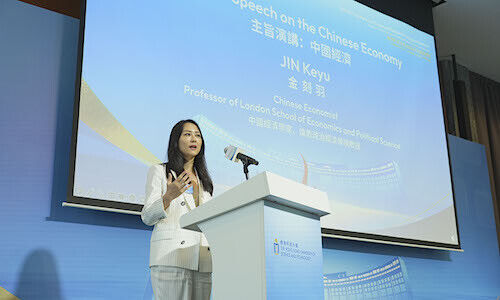A slowing economy with a myriad of looming risks has pundits wondering if China will be able to enter its next stage of growth. According to the LSE's Dr. Keyu Jin, the country is at a crossroads between control and liberalization.
A number of socioeconomic challenges are driving concerns about China's outlook. Growth is slowing as it attempts to transition to a new engine dependent on high-quality products and services. There are structural headwinds in play like high debt levels and an ageing population. Geopolitical risks remain elevated.
According to Dr. Keyu Jin, professor of economics at the London School of Economics and Political Science (LSE) as well as author of critically acclaimed book «The New China Playbook: Beyond Socialism and Capitalism», the country is now facing a «new age dilemma».
Striking a Balance
In describing the subject that her book covers, Jin notes that China is at a critical juncture in determining what model it wants to rely on moving forward. On one hand, it doesn’t want to fully adopt Western-style capitalism. On the other hand, there is are unanswered questions mark regarding the socialist agenda.
«Part of the reason that we've seen with the economic slowdown and with the other broader set of challenges, including geopolitical, is that [China is] trying to figure out exactly what balance it wants to strike,» Jin said during a media roundtable marking the Hong Kong University of Science and Technology’s (HKUST) launch of the Institute for Financial Research.
Tolerating Mega Wealth?
China has been undergoing crackdowns in various areas, including the tech and financial sectors, for reasons including its «common prosperity» drive. While this is in line with its socialist goals, it may not be conducive to its other goals.
«In order to achieve the trail-blazing innovation that countries like the US have, it maybe has to tolerate a few people getting extremely rich,» Jin explained. «Straddling between the two – control and the need to liberalize – is part of the growing pains I think that China faces. Macro factors like real estate […] are simply symptoms.»
Interdisciplinary Research
Many of the aforementioned challenges are not fully unique to China. Jin named three particular trends that are pertinent to other countries as well: politics as a driver of economics; the ability to jumpstart new sectors, especially with state involvement; and rethinking developing economies' reliance on manufacturing for growth due to new technologies enabling automation.
As a result, Jin highlighted the need for interdisciplinary research as a solution to better understand the issue. HKUST’s new institute includes four interdisciplinary research centers focused on technological innovations, environmental and social responsibility, wealth management, and macro-finance and geo-economics.
«I think this is where the opportunity lies. A lot of intersections and a lot of interdisciplinary approach will be important for some of the remaining issues of the day,» she said.





















